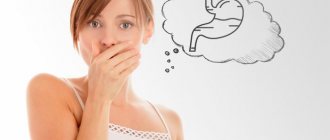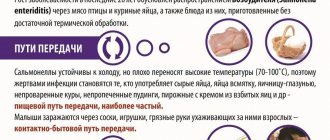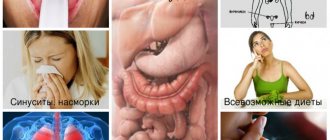Reasons and features
In medical practice, chills, nausea and vomiting are often observed during poisoning. In addition to the above symptoms, a person feels weakness, dizziness, increased body temperature, and signs of stomach upset appear. A severe degree of poisoning is accompanied by dehydration and requires immediate medical attention. In the absence of diarrhea, other causes of the pathological condition are considered.
Thus, chills and nausea accompany a panic attack, during which the pulse accelerates, blood rushes to the face, difficulty breathing and weakness are felt. In severe cases, a person loses control over himself and feels the fear of instant death. Despite the fact that thousands of people are susceptible to this condition, most of them do not attach much importance to it. Others, fearing a heart attack, panic and call emergency doctors.
A panic attack is characterized as a sudden, unaccountable fear that causes a characteristic reaction in the body. Most often, attacks occur at a young age in 2% of the population, which are regarded as “nerves” or “stress”, and can haunt people throughout their lives. This condition appears suddenly and lasts about an hour, during which there is increased heart rate and sweating, trembling, shortness of breath, chills, nausea, weakness and problems swallowing.
With repeated cases of panic or fear of its occurrence, a disease may develop - a panic attack, which more often manifests itself in females. Its causes are not fully understood, but it is believed that in this way the body intuitively activates defense systems, preparing to repel a possible threat. An urgent need for a drug, hyperthyroidism, and an impending heart attack can also lead to a panic attack. If you experience any symptoms of a panic attack, you should consult a doctor.
This particular incident is described in the video.
Other causes of nausea and vomiting may include nervous disorders caused by traumatic brain injury, bruises, or swelling of the brain.
The following diseases can also provoke the above symptoms:
- Migraine. Characterized by paroxysmal headache and nausea. The duration of symptoms depends on the severity of blood supply disorders in individual areas of the brain. The condition can last up to several days.
- Brain tumor. Characterized by severe, frequently recurring systematic headache and nausea.
- Meningitis. An infectious disease in which inflammation of the membranes of the brain and spinal cord occurs. It is characterized by severe headache, chills, nausea, increased body temperature, as well as darkening of the skin in the form of spots.
- Borelliosis. It is characterized by weakness, dizziness and headache, and nausea and vomiting are often observed. This affects the joints and skin, nervous system, joints and blood vessels.
- Arterial hypertension. The main symptom of the pathology is periodic headache, which is often accompanied by chills, nausea and vomiting.
The combined manifestation of chills and nausea can cause the following diseases:
- Pathologies of an infectious nature (scarlet fever, gastric meningitis, measles).
- Acute renal failure.
- Toxemia (poisoning of the body due to the breakdown of its own tissues).
- Inflammation of the respiratory tract (pharyngitis, sore throat, bronchitis).
- Hepatitis A in the preicteric stage.
- Cholangitis (inflammation of the bile ducts).
- Dyskinesia in the small intestine.
- Cholecystitis.
- Postoperative conditions after intervention in the respiratory and digestive systems.
The appearance of nausea and chills is a reason to contact a medical facility or call an ambulance, since self-diagnosis may be inaccurate, and self-medication is unacceptable. Certain diseases that cause chills and nausea can pose a threat to a person's life or health.
In what cases do you need specialist help?
If you feel chills due to poisoning, you must call a doctor in the following situations:
- Mushrooms were used. Even a small amount of low-quality or toxic products provokes a serious condition. Lack of professional therapy sometimes causes death.
- For pain in muscle tissue, weakness, difficulty swallowing, heavy breathing.
- If there is no urination for 8 hours. Kidney failure is likely due to accumulation of toxins.
- Diarrhea continues for more than a day, the stool contains blood, is watery, and has an unpleasant aroma.
Be sure to call an ambulance if a small child has been poisoned.
Intoxication during pregnancy threatens not only the health of the mother, but also the fetus. Therefore, when chills occur, seek medical help.
What to do?
Elimination of the symptoms of nausea and chills is associated with the treatment of a specific condition or disease that causes them. For this purpose, medical and folk remedies are used, as well as a special diet and nutrition correction.
Medicines
Depending on the nature of nausea and chills, the doctor may prescribe the following medications to eliminate them:
- Loperamide. Used to treat diarrhea of various nature, including emotional. Eliminates the root cause of nausea and chills in gastrointestinal disorders. Contraindicated in cases of hypersensitivity, dysentery, diverticulosis and conditions associated with intestinal obstruction and inhibition of peristalsis, under the age of 6 years. Price 11-55 rub.
- Regidron. A product for restoring water and electrolyte balance, correcting acidosis and energy balance during intense physical activity. Eliminates nausea and vomiting during intoxication. Contraindicated in cases of hypersensitivity, liver and kidney diseases, diabetes mellitus, intestinal obstruction, unconsciousness of the patient and hypotension. Price 390-410 rub.
- Diprazine. An antihistamine that calms the nervous system, enhances the effect of local painkillers, lowers body temperature and eliminates nausea. Contraindicated in drinking alcohol, impaired kidney and liver function, driving a car or operating complex mechanisms that require increased attention. Price 780-1450 rub.
- Paracetamol. Intended for use for pain of various origins, chills, fever, infectious and inflammatory diseases. Contraindicated in case of hypersensitivity, alcoholism, anemia, severe liver or kidney dysfunction, in the first trimester of pregnancy. Price 6-75 rub.
- Balm “Star”. Helps relax muscles and normalize blood flow, eliminates symptoms of infectious respiratory diseases and psycho-emotional disorders, relieves headaches and chills, and eliminates the feeling of nausea. Contraindicated in case of individual intolerance to the drug. It is recommended to conduct a susceptibility test before use. Price 60-220 rub.
Traditional treatment
The use of folk remedies can effectively relieve symptoms of chills and nausea. But before using them, be sure to consult with your doctor. For this purpose, the following traditional methods of treatment are used:
- Warm the body with warm clothes and periodically drink hot tea containing raspberries and lemon, which reduces the feeling of nausea. If there is no fever, it is recommended to take a warm bath or steam your feet in a basin.
- In a stressful situation or mental imbalance, it is recommended to drink a glass of water, breathe deeply and take tea containing lemon balm, mint, sage and chamomile.
- For severe headaches and chills (migraines), use a piece of cloth soaked in vinegar and olive oil, which is applied to the frontal part of the head. After a few minutes, the symptoms will begin to subside.
- St. John's wort decoction. Helps eliminate intestinal disorders and relieve headaches. Prepared by brewing 1 tbsp. l. dry herbs in a glass of boiling water, followed by infusion for 6 hours. Take 200 g after meals.
- Eating grapefruit, lemon or orange lowers body temperature, eliminating chills, and reduces the feeling of nausea.
Nutrition correction and diet
Taking medications for nausea and chills will help to stop the manifestation of unpleasant symptoms once. But if the cause of problems in the body is associated with intoxication or disease of the gastrointestinal tract, the following recommendations should be followed:
- If you feel nauseous, stop eating heavy food for 2-3 hours.
- Severe nausea and chills associated with fever can be relieved by fresh lemon.
- The best liquid to drink for nausea is still water or juice.
- Food should be consumed in small portions and chewed thoroughly.
- It is advisable to eat light meals (low-fat soup, broth).
- Include milk porridge in your diet.
- Drink freshly squeezed fruit juices.
If symptoms of nausea occur, limit the consumption of the following foods:
- Fatty, smoked and fried foods.
- Carbonated drinks, coffee, alcohol and energy drinks.
- Spicy foods.
- Conservation.
- Sweets.
If nausea is present for 3-5 days, this is reported to a gastroenterologist or therapist for diagnosis, identification of the cause of the disorder and prevention of possible unwanted complications (gastritis, ulcers).
Prevention
Preventive measures to prevent the occurrence of symptoms of nausea and chills are as follows:
- Careful monitoring of diet to prevent the possibility of poisoning.
- Compliance with hygienic and sanitary standards to prevent infection by various types of infections and environmental influences that can weaken the body and lead to diseases.
- Regular examination by a doctor to identify possible pathological conditions and diseases, and their timely treatment.
- Timely consultation with a doctor at the first appearance of symptoms of nausea and chills.
- Active lifestyle, adherence to daily routine and absence of bad habits.
The appearance of symptoms of nausea and chills indicates the presence of certain problems in the body. They may be the result of poisoning, certain mental conditions or diseases. To eliminate unpleasant sensations, it is necessary to find out their cause, and then begin treatment. For this purpose, contact a doctor who will diagnose and prescribe adequate therapy. Timely contact with a specialist increases the chances of eliminating the problem as quickly as possible and achieving a complete cure.
Note!
The presence of symptoms such as:
- pain in the left side from the back
- smell from the mouth
- heartburn
- diarrhea
- constipation
- belching
- increased gas formation (flatulence)
If you have at least 2 of these symptoms, then this indicates a developing
gastritis or ulcer.
These diseases are dangerous due to the development of serious complications (penetration, gastric bleeding, etc.), many of which can lead to
LETHAL
outcome. Treatment needs to start now.
Read the article about how a woman got rid of these symptoms by defeating their main cause using a natural method. Read the material... Don’t poison yourself with pills!
The presence of symptoms such as:
- nausea
- smell from the mouth
- heartburn
- diarrhea
- constipation
- belching
- increased gas formation (flatulence)
If you have at least 2 of these symptoms, then this indicates a developing
gastritis or ulcer.
These diseases are dangerous due to the development of serious complications (penetration, gastric bleeding, etc.), many of which can lead to
LETHAL
outcome. Treatment needs to start now.
Read the article about how a woman got rid of these symptoms by defeating their main cause using a natural method. Read the material…
If a person develops severe chills and the body breaks down, this means that a spasm occurs in the blood vessels and muscles of the skin.
The patient gradually develops the following symptoms:
- weakness and trembling throughout the body;
- increased sweating at night;
- nausea and vomiting;
- headache.
Chills without fever in women and men are accompanied by problems with the masticatory muscles. Most often, the reason for this condition lies in hypothermia, since in such a situation the temperature drops sharply and the person begins to shiver. This is how a protective reaction to cold manifests itself.
Why then does the temperature rise? This factor is caused by muscle spasm, which leads to an increase in the amount of heat in the body. If a person warms up quickly, the chills disappear naturally.
Chills are usually accompanied by fever, headache, nausea and vomiting, and normal body temperature changes to high. Chills without signs of fever are most often a symptom of the following pathological conditions:
- hormonal imbalances;
- poor blood circulation;
- various injuries;
- neuroses;
- fright
Treatment options
In most cases, treatment is carried out with medication. The patient is prescribed medications that will help get rid of the cause of nausea, chills, and headache. Surgery is only necessary in exceptional cases. The following methods are most often effective:
- painkillers – necessary to improve well-being during acute headaches;
- substances to relieve intoxication (sorbents) - prescribed for food poisoning;
- antidotes - specific compounds that act as an antidote for certain types of poisoning;
- drugs to restore normal intestinal microflora - effective after intoxication, long-term use of antibiotics, diseases of the digestive system;
- anti-inflammatory drugs - the main stage of treatment of gastritis, pancreatitis, hepatitis and other diseases;
- specific antiviral therapy for viral hepatitis;
- a special diet is necessary to restore the functioning of the gastrointestinal tract.
At the Clinical Brain Institute, you can get recommendations from leading experts, as well as receive treatment in a hospital setting. Drugs are prescribed individually, taking into account the patient’s age and exact diagnosis, medical history and other factors. It is important to take them according to the prescribed regimen, as well as follow all other recommendations at home.
Clinical Brain Institute Rating: 5/5 — 1 votes
Share article on social networks
Why do chills occur without fever?
It is important to know!
EVERYONE should know about this! UNBELIEVABLE BUT TRUE! Scientists have discovered a SCARY relationship. It turns out that the cause of 50% of all ARVI diseases, accompanied by elevated temperature, as well as symptoms of fever and chills, are BACTERIA and PARASITES, such as Giardia, Ascaris and Toxocara. How dangerous are these parasites? They can deprive health and EVEN LIFE, because they directly affect the immune system, causing irreparable harm. In 95% of cases, the immune system is powerless against bacteria, and diseases will not be long in coming.
To forget about parasites once and for all, while maintaining your health, experts and scientists advise taking.....
.. »
The cause of this pathological condition in women and men is a serious disruption in the functioning of any body system.
It is accompanied by weakness, general malaise, headache, nausea and even vomiting; the patient always wants to lie down to rest.
Chills without fever develop as a result of:
- stressful situations;
- severe hypothermia;
- infectious disease;
- ARVI;
- pathologies of the endocrine system;
- sudden jumps in blood pressure.
If the cause of chills is hypothermia, at this moment the person experiences a sharp narrowing of the blood vessels. In this pathological situation, the patient’s condition is characterized by slow blood flow and the appearance of problems with metabolic processes.
The patient says that he feels cold, and the condition worsens at night, when the body sweats more. You can improve your well-being with the help of special warming procedures and drinking hot drinks.
Chills without fever during a cold, as mentioned above, are the body’s natural defense. What to do in this case? If a person is very cold, the following will help in this situation:
- warm foot baths with the addition of medicinal herbs;
- hot milk with butter and natural honey;
- herbal infusions of strawberries, raspberries and currants.
After any treatment procedures, the patient should immediately go to bed and try to sleep. The body rests best during sleep.
When the cause of chills is some infectious pathogen, the patient’s body will most likely develop symptoms characteristic of general intoxication:
- nausea;
- vomit;
- headache;
- general weakness.
This condition is due to the fact that pathogenic microorganisms, penetrating the human body, begin to actively produce various toxins and poisons, which are the result of the vital activity of these bacteria. What to do in such a situation? Treatment of infectious diseases can only be prescribed by a doctor, so the patient must immediately contact a medical facility.
The reasons for the condition when there are chills, but no temperature, often lie in the fact that a person is constantly experiencing stress and nervous tension. Most often it is observed in women, since they experience it more deeply than men. In such a situation, the patient needs:
- try to calm down;
- take a decoction of sedative herbs;
- drink tea with lemon or sour berry decoction (blackcurrant, blackberry).
People with disorders of the vegetative-vascular system (dystonia) typically experience chills at night, less often during the daytime. Impaired blood circulation leads to the fact that these patients are cold all the time. This is why their extremities are constantly cold.
The condition when there is chills, but no temperature, is explained by a violation of the tone in the blood vessels. Taking a contrast shower, going to the sauna and other hardening activities will help make the circulatory system normal at least for a while. Hot procedures must be replaced by cold ones.
In order to remove toxins caused by stress from the body as quickly as possible, it is recommended for women and men to use a decoction of lingonberry leaves. However, in order to avoid such poisoning and its symptoms, which are headache, nausea and vomiting, you need to try to distance yourself from stressful situations and strive for a normal emotional environment. Nervous exhaustion poses a serious threat to the functioning of all internal organs.
Severe chills, in which there is no temperature, can occur in people susceptible to surges in blood pressure. During a hypertensive crisis, the state of the blood vessels changes, and this entails circulatory disorders.
When blood pressure returns to normal levels, the chills disappear completely.









